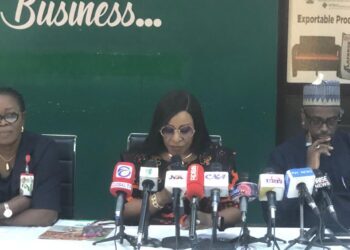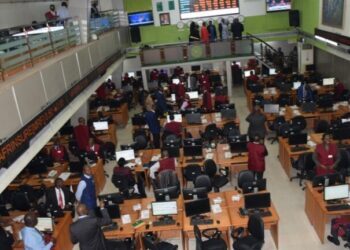Access Bank, Zenith, and FBN Holdings maintained the top spot as the largest banks in Nigeria based on the value of their total assets as of the first half of 2022.
According to Nairametric,the thirteen commercial banks listed on the Nigerian Exchange (NGX) with major operations in the country saw their aggregate asset value increase by 8.1% in the first six months of the year to stand at N63.59 trillion as of June 2022 from N58.83 trillion recorded as of the beginning of the year.
The top five banks were the major tier-1 financial institutions typically referred to as the FUGAZ, which is an acronym used to represent First Bank, UBA, GTCO, Access, and Zenith Bank. The top five banks accounted for 80.5% of the total asset of the industry. It is worth noting that Ecobank Transnational Incorporated was not included in the compilation because most of its operations are outside Nigeria.
A further breakdown of the data shows that the increase in the total assets of the banks was largely attributed to rises in customer loans. Although Union Bank recorded a decline in its total assets in the period under review, Stanbic IBTC recorded the highest increase with a 14.8% increase to stand at N3.15 trillion from N2.74 trillion as of the beginning of the year.
The top five banks in Nigeria by total assets are:
#5: GTCO – N5.69 trillion
Guaranty Trust Holding Company Plc (GTCO) posted a total asset value of N5.69 trillion as of June 2022, which is 4.6% higher than the N5.44 trillion recorded as of December 2021. GTCO accounted for 8.9% of the total assets of the thirteen banks.
The banking giant, which also restructured into a holding company last year saw its cash and bank balances with the Central Bank rise to N1.04 trillion in June 2022 from N933.59 billion as of the end of last year.
Also, loans to customers increased marginally from N1.8 trillion as of December 2021 to N1.83 trillion by the end of June 2022. Meanwhile, financial assets at fair value through profit or loss improved significantly from N104.4 billion to N262.32 billion.
#4: UBA – N8.99 trillion
United Bank for Africa ranks fourth on the list of biggest banks in Nigeria based on total assets with a value of 8.99 trillion, representing a 5.4% increase from N8.54 trillion recorded by the beginning of the year.
UBA accounted for 14.2% of the total asset value of the entire thirteen banks on the list. A further breakdown of the bank’s statement of financial position showed that it’s cash and bank balances improved to N1.98 trillion from N1.82 trillion recorded as of the beginning of the year.
Also, its loans and advances to customers increased to N2.75 trillion from N2.68 trillion, while loans to banks improved to N198.1 billion as of the period under review. Property and equipment stood at N183.6 billion, while investment securities at fair value stood at N1.63 trillion.
Largest banks in Nigeria by total assets as of H1 2022
#3: FBN Holdings – N9.53 trillion
FBN Holdings posted a total asset valuation of N9.53 trillion as of June 2022, representing a 6.6% increase from N8.93 trillion recorded six months earlier. FBN Holdings, which is the parent company for First Bank accounted for 15% of the total aggregate assets for the thirteen banks.
FBN’s asset growth can be attributed to increasing in its cash and balances, loan books, and investment securities. Its cash and balances with Central Bank rose from N1.59 trillion to N1.64 trillion in the six months period.
Also, its loans and advances to customers improved from N2.88 trillion as of December 2021 to stand at N3.38 trillion by the end of June 2022. It is worth adding that its investment securities rose to N2.16 trillion from N1.96 trillion.
On the flip side, its property and equipment declined marginally to N113.79 billion from N115.9 billion recorded as of December 2021.
#2: Zenith Bank – N10.12 trillion
Zenith Bank reported a total asset value of N10.12 trillion as of June 2022, an increase of 7.1% from N9.45 trillion recorded as of December 31st, 2022. Zenith Bank accounted for 15.9% of the total assets of the banks listed on the Exchange.
The increase in its total assets was as a result of improvement in its cash and balance with the Central Bank, treasury bills, loans to customers as well as investment securities.
The bank, which is also the most capitalized bank in the Nigerian equities market, saw its loan books increase to N3.49 trillion as of June 2022 from N3.36 trillion, while investment securities stood at N1.48 trillion.
In the same vein, property and equipment improved, albeit only marginally from N200 billion to N202.3 billion. Investment securities improved from N1.3 trillion recorded as of the beginning of the year to N1.48 trillion by the end of June 2022.
#1: Access Bank – N13.19 trillion
Access Holdings Plc tops the list with a total asset value of N13.19 trillion as of June 2022, representing an increase of 12.5% compared to N11.73 trillion recorded as of the beginning of the year.
The financial institution, which is a newly restructured holding company accounted for 20.8% of the total assets of the thirteen banks under consideration. The uptick in the total asset value of the bank can be attributed to improvements in some of the asset components, especially loans and advances.
Specifically, loans and advances to customers rose to N4.62 trillion as of the period under consideration from N4.16 trillion recorded as of the beginning of the year. This means that Access Bank gave out an additional N458.2 billion in loans to its customers in the first six months of the year.
Also, investment securities rose by N493.6 billion to stand at N2.76 trillion. The value of its property and equipment increased to N261.8 billion from N247.7 billion, having spent N36.7 billion on the acquisition of property and equipment in the same period.
Meanwhile, Access Bank has entered into a binding agreement with Centum Investment Company Plc to acquire its entire 83.4% equity stake held by Centum in Sidian Bank Limited.
Also, the holding company received regulatory approval in August 2022 to acquire a majority equity stake in First Guarantee Pension Limited, in a bid to evolve into a financial service holding company.
Others include
Fidelity Bank – N3.69 trillion
Stanbic IBTC – N3.15 trillion
FCMB – N2.65 trillion
Union Bank – N2.54 trillion
Sterling Bank – N1.81 trillion








